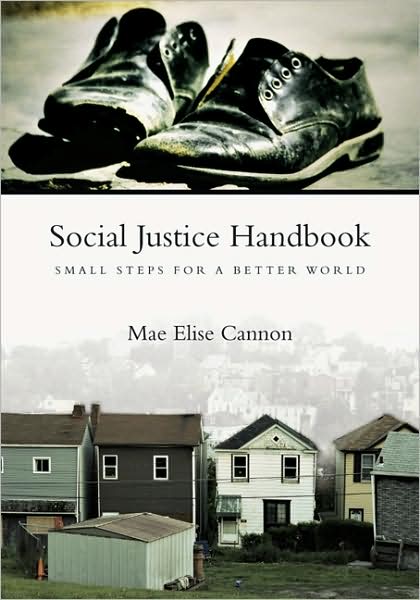Mae Elise Cannon and John Perkins, Social Justice Handbook: Small Steps for a Better World. IVP Books, 2009.
Referenced in: Social Ministry Strategies
LifeandLeadership.com Summary
This is a one-of-a-kind resource, providing a comprehensive guide to individual and group social activism. Many evangelicals will welcome this volume, as it looks at social compassion through a more biblically conservative lens than is typical of materials on this subject.
Part One presents the “Foundations of Justice,” including God’s heart for justice, a definition and history of social justice, moving from apathy to advocacy, and solutions to injustice. It is an adequate introduction to each of these topics for Sunday School classes or small groups. The spiritual reflection exercises interspersed throughout are also well-suited to this purpose. A teacher or group leader may want to supplement this handbook with more in-depth treatments of the theology of wealth (see resource guide on Theological and Philsophical Foundations of Social Ministry). The first section also provides a history and description of many Christian social justice organizations (e.g. Salvation Army).
The meat of the book is Part Two, which presents a guide to activism on over 70 social issues including abortion, AIDS, domestic abuse, genocide, poverty, racism, sex trafficking, and many more. For each subject, there is a brief overview of biblical teaching and important backgrounds, followed by several “take action” suggestions. The appendices provide a comprehensive list of social justice organizations as well as related books and movies.
This book would be a helpful introduction for churches or groups that are not well-acquainted with social justice, especially the more socially conservative (e.g. pro-life). These groups may experience other resources of this genre as extreme or less appreciative of teachings such as the sacredness of life. The Social Justice Handbook will broaden their perspectives and ministries to a more biblically balanced concern for the social, economic, and moral issues that are at near to the heart of God.
From the Publisher
Every day we are confronted by challenging societal problems, from poverty and institutional racism to AIDS and homelessness. It can all seem so overwhelming. But while none of us can do everything, all of us can do something. This handbook will help you discover what you can do.
Mae Elise Cannon provides a comprehensive resource for Christians like you who are committed to social justice. She presents biblical rationale for justice and explains a variety of Christian approaches to doing justice. Tracing the history of Christians in social engagement, she lifts out role models and examples from the Great Awakenings to the civil rights movement. A wide-ranging catalog of topics and issues give background info about justice issues at home and abroad, such as
- sex trafficking
- domestic violence
- living wage initiatives
- debt relief
- environmental stewardship
- bioethics
- and much, much more
This handbook includes dozens of practical exercises for taking action, as well as profiles of key figures and movements like William Wilberforce, the Salvation Army and Bono, highlighting how Christians and churches can make a difference. Also included are spiritual practices and resources to help us move from immobility to advocacy.
God has always worked through his people to accomplish improbable tasks, and he can use you too. This handbook will be an essential companion for living justly, loving mercy and walking humbly with your God.
About the Author
Mae Elise Cannon is the executive pastor of Hillside Covenant Church located in Walnut Creek, California. She previously served as director of development and transformation for extension ministries at Willow Creek Community Church in South Barrington, Illinois. She holds an M.Div. From North Park Theological Seminary, an M.B.A. from North Park University’s School of Business and Nonprofit Management, and an M.A. in bioethics from Trinity International University.
Cannon is an ordained pastor in the Evangelical Covenant Church (ECC). She is also the chair of The Mosaic Center board for the Pacific Southwest Conference in the ECC. She is completing her doctoral studies at the University of California-Davis where she is studying U.S. history and the role of the church in the history of social reform.
John Perkins, the son of a sharecropper, grew up in Mississippi amid dire poverty and rampant racism. Though he had fled to California after his older brother was murdered by a town marshal, he returned after his conversion to Christ in 1960 to share the gospel with his community. His leadership of civil rights demonstrations earned him repeated harassment, beatings and imprisonment. However, in recent years Perkins has received recognition for his work with seven honorary doctorates from Wheaton College, Gordon College, Huntington College, Geneva College, Spring Arbor College, North Park College and Belhaven College. He continues to speak and teach around the world on issues of racial reconciliation, leadership and community development.
Perkins is the founder of Voice of Calvary Ministries in Mendenhall, Mississippi, Harambee Ministries in Pasadena, California, and the Christian Community Development Association. His books include Let Justice Roll Down, With Justice for All, A Quiet Revolution and Linking Arms, Linking Lives.
***For additional information on this resource, including reviews, click the bookstore links. Check the reference at page top or the links below for resource guides on related topics.***
Related Areas
See Other Resources on Social Ministry Strategies:
See Other Resource Guides on Christian Social Ministry:
- Social Ministry, Introduction
- Theological and Philosophical Foundations of Social Ministry
- Spirituality for Ministry of Social Compassion and Justice
- Strategies For Christian Social Ministry
- Perspectives and Strategies For Social Ministry Among the Urban Poor, Urban Ministry
- Christian Perspectives on Political Theory and Church-State Relations
- Christian Perspectives on Economics and Public Policy


